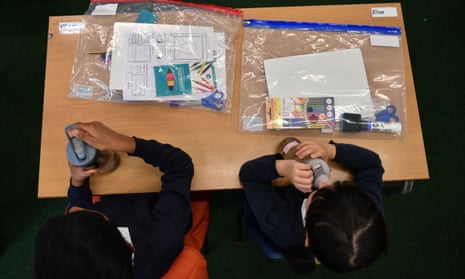Huge disparities in the amount of classroom time pupils have received across England since schools reopened in September have been revealed by stark new figures on school attendance.
Attendance ranged from as little as 37% in the West Midlands borough of Sandwell to 92% in Southend-on-Sea, Essex, during one week alone, according to the first breakdown of missed school days by council area.
The 10 boroughs in England where children’s education has been most disrupted since schools reopened following six months of lockdown are all areas where deprivation is worse than the national average.
In Oldham, one of the worst-hit areas, one headteacher said: “Self-harm has gone through the roof” after almost 200 year 11s missed five weeks of learning.
The children’s commissioner, Anne Longfield, voiced concern that schools in the worst-affected areas were getting a “quadruple hit”. She said disruption to attendance and increased pandemic costs came on top of existing poorer educational outcomes and deprivation.
Sandwell, a densely populated borough, which also experienced a localised “mini lockdown” in the summer, had the highest level of missed classroom time since September, with 9.6 days being missed per pupil. It was followed by Oldham (9.2), Rochdale (9.1), Tower Hamlets in east London (8.5) and Medway in Kent (8.1). The national average was 4.7.
Glyn Potts, the head of Newman Roman Catholic college in Oldham, had to send almost 200 year 11s home for five weeks, with 300 year 10s missing a fortnight and smaller groups in years 7 and 8 also forced to isolate. Twenty-one percent of his pupils do not have access to a laptop, making online learning difficult for many. Of the 237 laptops he applied for via the government scheme, only 34 arrived.
The year 11s feel particularly anxious at the prospect of sitting GCSEs next summer “alongside peers in other parts of the country who haven’t yet missed a day”, said Potts.

The school has upped mental health resilience lessons from one hour a week to 40 minutes every day and brought in more counsellors.
Forty-three percent of pupils in his large state comprehensive qualify for free school meals, well over twice the national average. Deprivation makes them more vulnerable to Covid, Potts believes. “A lot of our parents are in hospitality or low-income jobs, and are on zero-hours contracts. So the moment this started to bite in the north, they were the ones who were impacted. We unfortunately had one case where a parent had to choose between going to work and feeding their children when they tested positive, and of course they chose to go to work.”
Maria Crompton, Sandwell council’s deputy leader, said: “In Sandwell we have consistently followed Public Health England advice on managing Covid-19 in schools. We will not take chances with the health of school staff, pupils and their family members.”
Jim McMahon, the Labour MP for Oldham West and Royton, said: “We need to hear a clear plan from the DfE on how schools in Oldham can begin to catch up our young people on the school they have missed, because we know that the best place for our young people to be is in school.”
Debra Kidd, a teacher trainer in Saddleworth, Oldham, said her 13-year-old son, Sam, a year 9 pupil, had been forced to isolate for four weeks because of outbreaks in his bubble, leaving him and his friends “anxious and feeling cut-off”.
“The response from the government has been nothing short of dishonest,” she said. “I can understand the reluctance to close schools, but I think they could have taken so many measures to help schools stay open and they haven’t. They have abdicated their responsibility to keep schools safe, and fuelled the spread of the virus.”
About 575m days of school had been missed by children in England by the time schools reopened for all pupils in September after their closure in March, according to the children’s commissioner.
Against the backdrop of increasing community transmission and stretched resources, Longfield insisted that schools had done “remarkably well” so that children got an education, while also limiting the risks from Covid-19.
Her briefing added that a one-week delay to the start of the January term would in effect double the average amount of classroom learning children have missed since September.
Teaching union leaders, meanwhile, questioned how it would be fair on pupils in places such as Hull, which has had less than 60% attendance in secondary schools for much of the last half term, to sit exams under the same conditions as peers in York or West Sussex where secondary attendance averaged 90% over the term.
“These attendance figures that have been hidden from the public for so long show just what a profound impact coronavirus has had on schooling in many areas,” said Kevin Courtney, the joint general secretary of the National Education Union.
The education secretary, Gavin Williamson, said approximately 99% of schools have been open each week since the start of term, and keeping those schools open remained a national priority.
From January, a new programme of rapid testing would help keep more staff and young people in school by identifying positive cases more quickly and breaking chains of transmission, he added.
The government had yet to deal with the fact that some pupils will have lost much more learning than others, warned Natalie Perera, the chief executive of the Education Policy Institute thinktank.
“While measures have been put in place to help all pupils with their exams next summer, there is still the fundamental question of how to support those who are at more of a disadvantage than others after having been out of the classroom for very long periods.”
